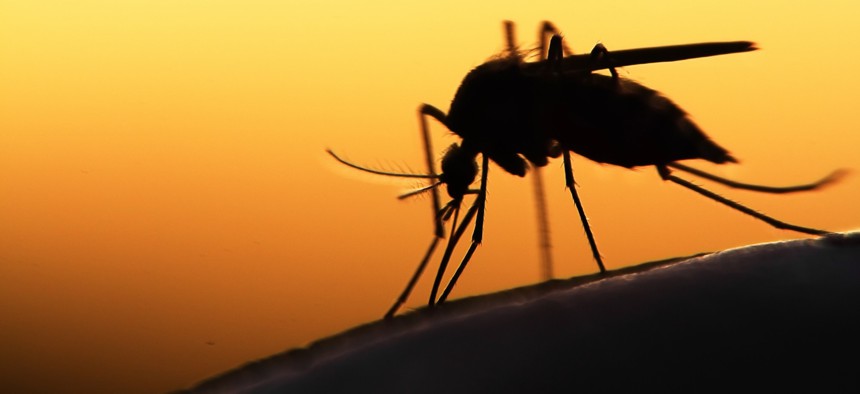State and Local Public Health Agencies Are Closely Monitoring Zika Virus Threat

mycteria / Shutterstock.com
In Harris County, Texas, authorities are urging residents to take preventative steps to protect themselves from mosquitoes.
On Monday, the World Health Organization classified the Zika virus outbreak that’s currently raging in more than 20 countries in Central and South America as a “public health emergency of international concern.” As the global scope of the threat evolves, U.S. public health agencies at the federal, state, county and municipal level are keeping a careful eye on the virus.
For the majority of the population, Zika virus, if contracted, is relatively mild. Symptoms include fever, joint pain, eye redness and rashes. Roughly 80 percent of those infected with the virus are asymptomatic. The most troubling development is the suspected link between the growing Zika outbreak and an increase in the number of infants born with a condition called microcephaly, or abnormally small heads and brains.
The federal Centers for Disease Control and Prevention has urged pregnant women to avoid travel to affected areas.
The WHO anticipates the disease, which is transmitted by mosquitoes, will eventually spread to all but two countries in the Americas—continental Chile and Canada.
State and local health authorities across the United States are keeping an eye on the development of the outbreak. Up to eleven states—including Virginia, New Jersey and Illinois—have already confirmed cases of Zika virus in travelers returning from affected countries. On Wednesday, Florida Gov. Rick Scott declared a state of emergency in the counties where Zika virus cases had been confirmed. Many health officials believe it is only a matter of time before local mosquito transmission of the virus occurs in the United States.
In Harris County, Texas, which includes the city of Houston, seven cases of foreign-transmitted Zika have been confirmed. Local health officials are monitoring the situation closely. The county has taken a proactive approach to both assessment and preventative measures.
“Prevention is key to reducing the risk of Zika virus infection,” Umair A. Shah, the executive director of Harris County Public Health and Environmental Services, said in a statement released last month. “Zika virus infections occur throughout the world. We encourage individuals traveling to areas where the virus has been identified to protect themselves against mosquito bites, and to contact their healthcare provider immediately if they develop Zika virus-like symptoms.”
To monitor the region’s risk of local transmission, Harris County health officials have also been checking mosquito traps daily. They have yet to find a Zika-infected mosquito.
“There is a possibility Zika virus may be in our mosquito population, and so that’s what we’re really mindful of,” Shah said in an interview with KHOU-TV in mid-January.
“With nature, you never know,” Mustapha Debboun, director of the Harris County Public Health and Environmental Services’ Mosquito Control Division, told Route Fifty in an interview on Wednesday.
Debboun said that his department “is doing all it can to help the community by using integrated methods of mosquito control to combat the Zika virus.”
First and foremost, the county is deploying an educational approach to preventing the virus. The county’s health department has stepped up educational measures on its website, as well as on social media.
Debboun said that his division is also emphasizing the need for the broader community to work with health officials to combat the potential spread of the virus.
“The key message is that [communities] really need to help us remove the source where the mosquitos breed,” Debboun said.
Beyond education, breeding area removal and mosquito surveillance, the county has the ability to used chemical sprays to combat the spread of disease-transmitting mosquitoes.
But Debboun noted that the spraying techniques that have been used in the past are better suited to eliminating the Culex mosquitoes that spread West Nile Virus, and are not as effective against the Aedes mosquitoes that spread Zika.
Officials in Harris County have formed a working group that will propose a Zika response plan within the next two to three weeks.
U.S. health officials also want to people to know that the risk of a large-scale Zika virus outbreak is low. Many of the living conditions that make exposure to Zika virus-carrying mosquitos more of a danger in countries like Brazil and Colombia are less prevalent in the United States.
In a briefing last week Thursday, Anne Schuchat, the CDC’s principal deputy director, said “any outbreaks of Zika in the continental U.S. will likely be limited.”
In Harris County, officials are leading with a similarly measured approach. When asked about his level of concern, Shah told KHOU-TV: “[Are we] concerned? No. Worried? No. But, those are things we want to continue to watch.”
Quinn Libson writes for Government Executive’s Route Fifty.
NEXT STORY: N.Y.C. Plans to Make Mobile Phone Meter Payments Possible for 85,000 Parking Spots






